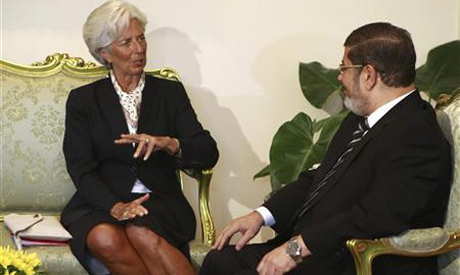 The International Monetary Fund (IMF)’s proposed $4.8 billion loan will not be enough for Egypt to overcome its post-revolution economic dilemmas, David Malone, president of Canada’s International Development Research Centre (IDRC), said in Cairo on Sunday.
The International Monetary Fund (IMF)’s proposed $4.8 billion loan will not be enough for Egypt to overcome its post-revolution economic dilemmas, David Malone, president of Canada’s International Development Research Centre (IDRC), said in Cairo on Sunday.
Malone, a renowned development scholar, said that a "western tailored" development model was "not what Egypt needed at the moment," stressing that international borrowing – although badly needed – was not necessarily the solution to Egypt’s chronic economic woes.
“Only Egyptians," Malone said, would be able to formulate a development plan compatible with Egyptian social dynamics and the country’s economic potential.
"International institutions cannot be a substitute for internal decision-making,” said the IDRC head, adding that development formulas dictated by the IMF and other international bodies had repeatedly failed in developing countries, such as Argentina and India.
A series of austerity measures is expected to accompany the loan deal, including across-the-board subsidy cuts aimed at reducing Egypt's ever-widening budget deficit.
"The real issue is that economic management is missing from the political discourse; day-to-day politics seems to be the current priority," asserted Malone. "Egypt is in desperate need for economic management."
Economic growth is a prerequisite to Egypt's development effort, he said, but growth must be accompanied with sound governance to combat long-term structural deficiencies, such as corruption and a crumbling public sector that hinders development efforts.
The proposed IMF loan is seen by the Egyptian government as vital to propping up the state's battered finances. Ratification of the deal would also unlock billions of dollars of additional aid from foreign governments.
The IDRC is currently planning to fund a handful of agricultural research programmes in Egypt, along with other programmes focussing on job creation, environmental preservation and anti-sexual harassment awareness.
Since 1971, the IDRC has pumped more than LE400 million into Egyptian development projects.



